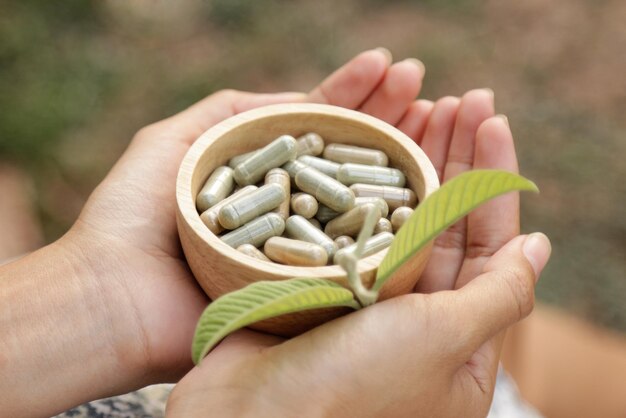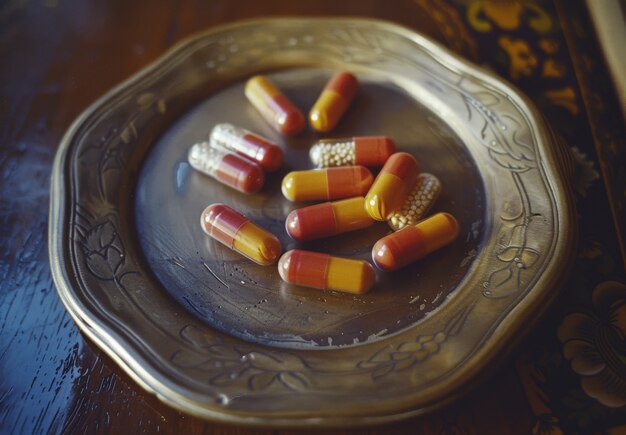Ask Ayurvedic doctor a question and get a consultation online on the problem of your concern in a free or paid mode. More than 2,000 experienced doctors work and wait for your questions on our site and help users to solve their health problems every day.
Vishtinduk Vati Benefits: A Science-Based Ayurvedic Guide

Did you know that herbal therapies remain a core element of healthcare for more than 80% of the global population, according to the World Health Organization (WHO)? In the realm of Ayurveda, India’s ancient system of medicine, Vishtinduk Vati holds a unique place. From digestive support to stress management, this formulation has been traditionally used for a myriad of reasons. But how much of this is backed by modern research? And what should you keep in mind if you’re considering adding it to your healthcare regimen? In this article, we will explore vishtinduk vati benefits, examine the science behind it, and provide practical advice for safe usage.
Table of Contents
Don't wait or self medicate. Start chat with Doctor NOW
What Is Vishtinduk Vati?
Vishtinduk Vati is an Ayurvedic herbal formulation primarily derived from the seeds of the Strychnos nux-vomica plant, often referred to as the “poison nut” or “Kuchla” in traditional texts. Despite the plant’s ominous name, when processed correctly using Ayurvedic methods, the seeds are believed to confer therapeutic properties. Vishtinduk Vati typically comes in tablet form and is widely recognized in Ayurveda for its potential effects on:
-
Digestive regulation
-
Neuromuscular coordination
-
Stress and anxiety reduction
The process of preparing Vishtinduk Vati usually involves detoxification steps that reduce the natural toxicity of the plant seeds. In Ayurveda, this transformation is crucial to ensure the safety and efficacy of the final formulation.
Traditional Ayurvedic Perspective
In classical Ayurvedic texts, Vishtinduk Vati is described as a medication for vata and kapha dosha imbalances. Ayurveda identifies three fundamental energies or “doshas” (vata, pitta, kapha), each governing different aspects of physiology and psychology. An imbalance in these doshas is believed to manifest as health issues.
-
Vata (Air and Ether Elements): Governs movement, both physical and mental.
-
Kapha (Earth and Water Elements): Governs structure, lubrication, and stability.
Vishtinduk Vati has ushna (heating) properties, which may help pacify vata and kapha doshas while potentially aggravating pitta if used incorrectly. Ayurvedic practitioners often recommend it for disorders characterized by sluggishness, lack of coordination, or poor digestion—conditions thought to be influenced by vata-kapha imbalances.
Key Components and Their Roles
The chief ingredient, Strychnos nux-vomica seeds, contains several alkaloids such as strychnine and brucine. While these substances are toxic in their raw form, the detoxification process in Ayurveda aims to diminish their harmful effects, harnessing their potential therapeutic value. Traditional processing (known as shodhana) involves soaking, boiling, or fermenting the seeds with various herbal liquids or cow’s milk to neutralize toxicity.
Additionally, some formulations of Vishtinduk Vati may include supportive herbs like:
-
Piper longum (Pippali): Often added to enhance bioavailability and digestion.
-
Zingiber officinale (Ginger): Known for anti-inflammatory properties.
-
Black Pepper: May contribute to better absorption and metabolic function.
The synergy of these components, according to Ayurvedic principles, is what sets Vishtinduk Vati apart from single-ingredient supplements.
Potential Health Benefits
4.1 Digestive Health Support
One of the most commonly cited vishtinduk vati benefits is its impact on digestion. Ayurvedic practitioners often use it to:
-
Stimulate appetite and promote the breakdown of foods.
-
Alleviate symptoms of bloating and gas.
-
Enhance the function of the stomach and intestines.
In mild cases of constipation, some practitioners recommend Vishtinduk Vati to restore gut motility. However, scientific validation on these claims is still evolving, and individual responses may vary.
4.2 Neurological and Musculoskeletal Benefits
Ayurvedic tradition associates Vishtinduk Vati with neuromuscular coordination. Historically, it has been used to:
-
Support muscle strength and reduce spasms.
-
Improve neurological function and reflexes.
-
Enhance motor coordination, especially in older adults.
While preliminary lab studies suggest that the alkaloids in the seeds might influence neurotransmitter pathways, more rigorous human clinical trials are needed to confirm these findings.
4.3 Stress and Anxiety Management
Ayurveda views stress as a disturbance in vata, which leads to restlessness, anxiety, and sleep disorders. Vishtinduk Vati, with its warming and stabilizing properties, is sometimes recommended to:
-
Calm the mind and reduce episodes of acute stress.
-
Improve sleep quality by promoting relaxation.
However, these stress-related benefits are primarily anecdotal or based on small, preliminary studies. If you experience chronic stress or anxiety disorders, consult a qualified mental health professional for comprehensive treatment.
4.4 Respiratory System Support
Some Ayurvedic practitioners include Vishtinduk Vati in their protocols for respiratory conditions characterized by mucous congestion (a kapha-related issue). It is sometimes combined with other herbs like Vasa (Adhatoda vasica) or Tulsi (Holy Basil) to:
-
Help expel phlegm from the respiratory tract.
-
Provide relief from mild respiratory discomfort.
Scientific research specifically linking Vishtinduk Vati to respiratory benefits is limited, and more data are needed for conclusive evidence.
Scientific Evidence and Research Findings
Modern research on Vishtinduk Vati remains relatively sparse compared to more commonly studied Ayurvedic formulations like Ashwagandha or Turmeric. However, a few peer-reviewed studies suggest its therapeutic potential:
-
Alkaloid Interaction: A study published in the Journal of Ethnopharmacology (2019) investigated the bioactive alkaloids of Strychnos nux-vomica and their potential role in pain management. The research highlighted the need for carefully calibrated dosages due to the narrow safety margin of strychnine.
-
Neurological Benefits: A pilot study in an Ayurvedic research journal (2020) suggested that Vishtinduk Vati, when purified properly, showed potential in improving certain neuromuscular functions, although the sample size was small, warranting larger clinical trials.
-
Bioprocessing Techniques: Various Ayurvedic institutions (e.g., Banaras Hindu University in India) have conducted laboratory analyses on the detoxification process of Strychnos nux-vomica, aiming to standardize formulations.
Because this remedy involves a potentially toxic substance, expert oversight is paramount. The regulatory and scientific communities continue to emphasize the importance of validated manufacturing protocols to ensure safety.
Recommended Usage and Dosage
Determining the right dosage of Vishtinduk Vati can be complex. It depends on multiple factors, including your:
-
Age and general health
-
Specific condition or symptoms
-
Other medications or supplements you’re taking
In Ayurveda, typical recommendations for Vishtinduk Vati might range from 125 mg to 250 mg once or twice a day, often taken after meals. However:
-
Always Consult a Qualified Practitioner
-
The potency of the product may vary from one manufacturer to another.
-
A trained professional can tailor the dosage to your unique body constitution (prakriti) and health status.
-
-
Start Low, Go Slow
-
Begin with the lowest effective dose.
-
Observe how your body responds before making any adjustments.
-
-
Monitor for Side Effects
-
Nausea, restlessness, or dizziness could indicate that the dose may be too high or improperly detoxified.
-
Safety, Side Effects, and Interactions
Due to the presence of strychnine and brucine, safety is a primary concern when it comes to Vishtinduk Vati. Here are key points to keep in mind:
-
Potential Toxicity: Improperly processed Strychnos nux-vomica seeds can lead to severe symptoms like muscle spasms, convulsions, and even respiratory failure.
-
Drug Interactions: If you are on prescription medications—especially for neurological or cardiovascular issues—discuss potential interactions with your healthcare provider.
-
Pregnancy and Breastfeeding: The use of Vishtinduk Vati is generally contraindicated for pregnant or nursing women due to safety uncertainties.
-
Allergic Reactions: Some individuals may be hypersensitive to the components. Watch for skin rashes, itching, or other signs of an allergic reaction.
The key takeaway: Vishtinduk Vati is not a casual supplement you pick up off the shelf. Its usage should involve proper guidance from an Ayurvedic or integrative healthcare practitioner.
Expert Tips for Maximizing Vishtinduk Vati Benefits
-
Choose a Reputable Brand
-
Look for manufacturers who comply with Good Manufacturing Practices (GMP) and provide third-party testing data.
-
-
Consider Lifestyle Changes
-
Dietary adjustments, such as increased fiber intake for better digestion, can work synergistically with Vishtinduk Vati.
-
-
Combine with Complementary Therapies
-
Yoga, meditation, and stress management techniques may enhance the formula’s calming benefits.
-
-
Track Your Progress
-
Keep a health journal noting any improvements or side effects.
-
Share these insights with your healthcare provider for ongoing adjustments.
-
Frequently Asked Questions (FAQ)
Q1: Is Vishtinduk Vati legal and regulated?
Yes, it is legal in many countries, particularly India, where Ayurveda is widely recognized. However, regulation may vary, and it’s crucial to buy from reputable sources.
Q2: How quickly will I notice any benefits?
Effects can vary. Some individuals report improvements within a few days, while others may need several weeks to see tangible results. Consistency is key.
Q3: Can I take Vishtinduk Vati alongside Western medications?
It depends on the medication. Always consult a qualified healthcare provider to avoid any potential negative interactions.
Q4: What is the difference between Vishtinduk Vati and other Ayurvedic formulations?
Vishtinduk Vati specifically contains Strychnos nux-vomica seeds, known for their neuromuscular and digestive support properties. Other Ayurvedic remedies use different herbs and serve different therapeutic purposes.
Q5: Is a prescription required?
In most regions, it’s classified as an over-the-counter Ayurvedic product. Nonetheless, because of its potency, professional guidance is strongly recommended.
Conclusion and Call to Action
Vishtinduk Vati stands at the intersection of rich Ayurvedic heritage and modern scientific inquiry. From purported digestive support to potential neurological benefits, vishtinduk vati benefits are diverse yet require cautious and informed application. If you’re considering exploring this formulation:
-
Consult a qualified Ayurvedic practitioner for personalized advice.
-
Opt for high-quality, standardized products backed by third-party verification.
-
Keep an open dialogue with your healthcare provider, especially if you have pre-existing conditions.
If you found this article helpful, share it with friends, leave a comment about your experiences or questions, and subscribe to our newsletter for more in-depth articles on holistic health and wellness.
References:
-
World Health Organization. (2013). WHO Traditional Medicine Strategy.
-
Journal of Ethnopharmacology. (2019). [Various studies on the pharmacological properties of Strychnos nux-vomica].
-
Banaras Hindu University (BHU) – Department of Dravyaguna (Ayurvedic Pharmacology). (2020). [Detoxification methods of Strychnos nux-vomica seeds].
-
PubMed Central Database. (Accessed periodically for updates on Ayurvedic research).
By balancing ancient wisdom with modern science, you can make informed decisions and fully explore the potential benefits of Vishtinduk Vati. Stay informed, stay safe, and here’s wishing you a holistic journey toward better health.



